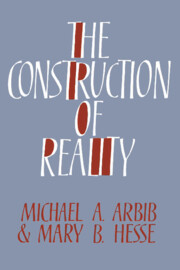Book contents
- Frontmatter
- Contents
- Preface
- Chapter 1 Posing the problem
- Chapter 2 The intelligence of the artificial
- Chapter 3 Schema theory
- Chapter 4 Relating mind and brain
- Chapter 5 Freedom
- Chapter 6 Freud on psychology and religion
- Chapter 7 Schemas: from the individual to the social
- Chapter 8 Language, metaphor, and a new epistemology
- Chapter 9 Interpretation and reality
- Chapter 10 Religions as social schemas
- Chapter 11 The Great Schema
- Chapter 12 Secular schemas
- References
- Author index
- Subject index
Chapter 9 - Interpretation and reality
Published online by Cambridge University Press: 22 September 2009
- Frontmatter
- Contents
- Preface
- Chapter 1 Posing the problem
- Chapter 2 The intelligence of the artificial
- Chapter 3 Schema theory
- Chapter 4 Relating mind and brain
- Chapter 5 Freedom
- Chapter 6 Freud on psychology and religion
- Chapter 7 Schemas: from the individual to the social
- Chapter 8 Language, metaphor, and a new epistemology
- Chapter 9 Interpretation and reality
- Chapter 10 Religions as social schemas
- Chapter 11 The Great Schema
- Chapter 12 Secular schemas
- References
- Author index
- Subject index
Summary
Objectivity and the human sciences
Philosophy of science and schema theory have provided us with two approaches to a theory of knowledge as construction. In this theory, a knowing subject bases a dialogue with external reality on schemas or theoretical languages embodying a “construction of reality.” Schema theory builds on elementary processes of assimilation and accommodation whereby the individual's sensorimotor schemas come to provide anticipations of the effects of action in the world. We have seen similar processes, operating at the level of groups rather than individuals, in the network view of philosophy of science. Both schema theory and the network view of science have led to a theory of language in which metaphor is normative, with literal meaning as the limiting case.
The resulting epistemology combines coherence and correspondence criteria of truth and dissolves the barriers between “objective” science and nonscience. In this chapter, we look at the alternatives to “objectification” proposed as modes of knowledge in hermeneutic and critical philosophy and suggest that our viewpoint reveals unities in these diversities. Just as we see a continuum between literal and metaphorical meanings, so we do not posit a sharp dichotomy between the natural sciences on the one hand and the social or literary hermeneutic sciences on the other. Special pragmatic or “objective” aims are predominant in the natural sciences, though also to some extent applicable elsewhere; on the other hand, hermeneutic considerations apply in the natural sciences, particularly in connection with theoretical interpretations and “world models.”
- Type
- Chapter
- Information
- The Construction of Reality , pp. 171 - 196Publisher: Cambridge University PressPrint publication year: 1986



